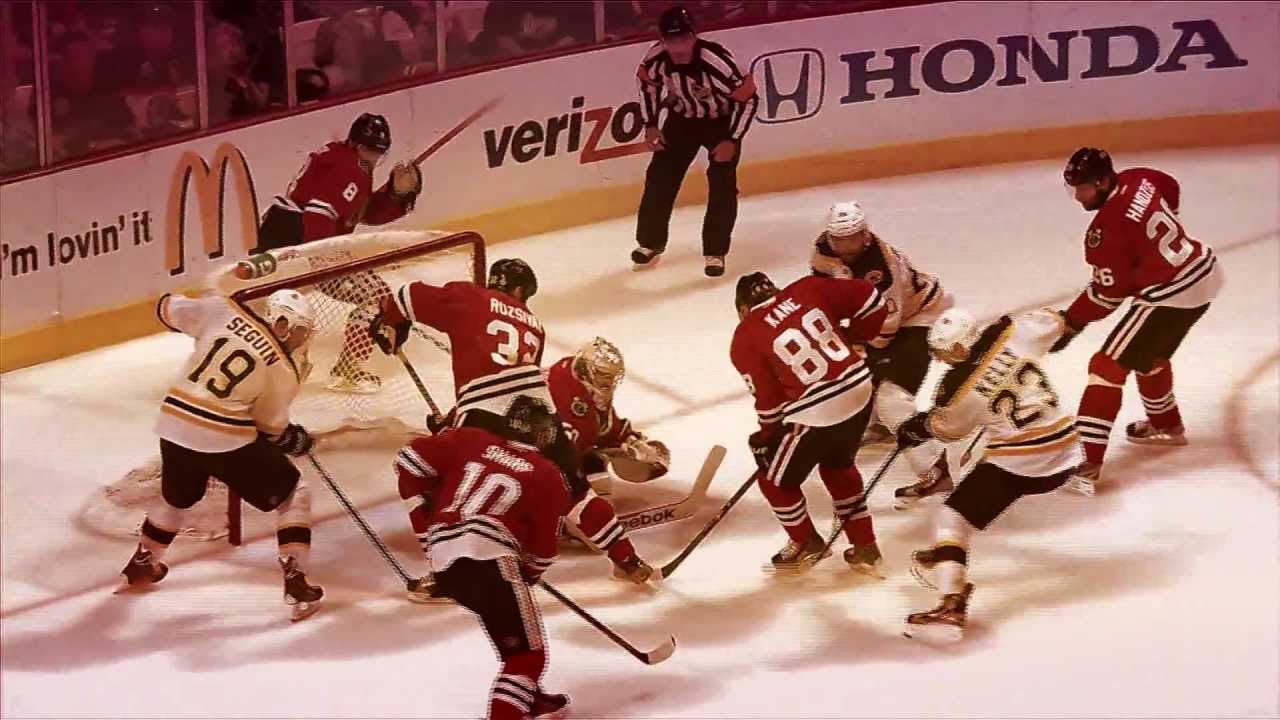Joseph Henri Maurice Richard was the first great goal scorer in National Hockey League history.
Born on August 4, 1921, in Montreal, his parents-who moved from the Gaspe region of Quebec after getting married—were of humble means. Richard [pronounced ree-SHARD] was the eldest of eight children and the family struggled after the father, Onesime, lost his job as a carpenter with the Canadian Pacific Railway during the Great Depression. Richard began skating at four but did not play organized hockey until 14. He boxed and played baseball, but hockey was his passion. Richard played in several leagues—providing phony names to circumvent rules restricting a player to one team—and scored 133 of his team’s 144 goals in the 1938-39 season. Richard studied to be a machinist at Montreal Technical School before joining the Verdun Juniors at age 18. The following year, he was promoted to the Montreal Canadiens’ affiliate in the Quebec Senior Hockey League but broke his ankle early in the season, aborting his hopes of joining the Canadian military after being deemed unfit for duty. He earned a tryout with the NHL Canadiens, who were desperate for players not in the military during World War II, and made the team, signing for $3,500 for the 1942-43 season.
On November 8, 1942, Richard scored his first goal, against the New York Rangers, before again breaking his ankle 16 games into his rookie season. The ankle was permanently deformed, forcing him to alter his skating style, but Richard came back strong the following year. After being moved from left wing to right and being paired with “Toe” Blake and Elmer Lach to from the “Punch Line,” Richard scored 12 playoff goals—including a record-tying five-goal effort against Toronto in which he was named the first, second and third star of the game—to lead Montreal to their first Stanley Cup championship in 13 seasons. In 1944-45, Richard became the first player in hockey history to score 50 goals in 50 games—a feat later matched only by Mike Bossy, Wayne Gretzky, Mario Lemieux and Brett Hull—while also scoring eight points in one game [5 goals, 3 assists] to set a new mark, as the Punch Line finished first, second and third in league scoring. He led the NHL in goals in 1946-47, was awarded the Hart Trophy as league MVP and led Montreal to their second Stanley Cup in three years. In March 1955, Richard hit Hal Laycoe with a retaliatory slash to the head then punched linesman Cliff Thompson when the official intervened, resulting in Richard’s suspension for the remainder of the season and playoffs by NHL President Clarence Campbell. French Canadians, believing the suspension an injustice and accusing Campbell of bias against from Quebec, pelted Campbell with debris at Montreal’s next home game—resulting in a Canadiens’ forfeiture and resulting in a mob of over 20,000 people looting in the streets of Montreal in what has come to be known as the “Richard Riot.” The following season, Maurice Richard was made captain and led the Canadiens to five straight Stanley Cup titles before retiring after the 1960 season.
“Rocket” Richard was the most exciting player to join the NHL in a generation and was a hero to French Canadians as Muhammad Ali is to African-Americans. He was the game’s greatest offensive force–the bigger the stakes, the better he played–scoring six career playoff game-winning goals and hoisting eight Stanley Cups in his 18 year career. In an era when scoring 20 goals a season made a player a star, Richard did it 14 times. He scored 30 or more goals nine times and over 40 in five seasons. “Rocket” played in 14 All-Star Games, led the league in goals on four occasions, had 26 career hat tricks [three goal games] and was the heart and soul of the Montreal Canadiens. Richard was the first player to score 50 goals in 50 games, first to score 500 career goals and is one of three players in history to tally 500 goals in fewer than 1,000 games. His devastating shot, blinding speed and toughness made him the greatest goal scorer in the rich history of the Montreal Canadiens, as he retired with 544 career goals and 945 points. Following his retirement in 1960, the NHL waived the usual three-year waiting period and immediately inducted him into the Hockey Hall of Fame. The Canadiens retired his number 9 sweater in 1961 and the NHL awards the Maurice Richard Trophy to the league’s leading goal-scorer during the regular season. When Mr. Richard died in 2000, his state funeral was nationally telecast, making him the first athlete in Canadian history to receive this honor.
“The Rocket was more than a hockey player. It was his fury, his desire and his intensity that motivated the Montreal Canadiens.”
– Former Canadiens coach Dick Irvin

![Joseph Henri Maurice Richard was the first great goal scorer in National Hockey League history. Born on August 4, 1921, in Montreal, his parents-who moved from the Gaspe region of Quebec after getting married—were of humble means. Richard [pronounced ree-SHARD] was the eldest of eight children and the family struggled after the father, Onesime, lost his job as a carpenter with the Canadian Pacific Railway during the Great Depression. Richard began skating at four but did not play organized hockey until 14. He boxed and played baseball, but hockey was his passion. Richard played in several leagues—providing phony names to circumvent rules restricting a player to one team—and scored 133 of his team’s 144 goals in the 1938-39 season. Richard studied to be a machinist at Montreal Technical School before joining the Verdun Juniors at age 18. The following year, he was promoted to the Montreal Canadiens’ affiliate in the Quebec Senior Hockey League but broke his ankle early in the season, aborting his hopes of joining the Canadian military after being deemed unfit for duty. He earned a tryout with the NHL Canadiens, who were desperate for players not in the military during World War II, and made the team, signing for $3,500 for the 1942-43 season. On November 8, 1942, Richard scored his first goal, against the New York Rangers, before again breaking his ankle 16 games into his rookie season. The ankle was permanently deformed, forcing him to alter his skating style, but Richard came back strong the following year. After being moved from left wing to right and being paired with “Toe” Blake and Elmer Lach to from the “Punch Line,” Richard scored 12 playoff goals—including a record-tying five-goal effort against Toronto in which he was named the first, second and third star of the game—to lead Montreal to their first Stanley Cup championship in 13 seasons. In 1944-45, Richard became the first player in hockey history to score 50 goals in 50 games—a feat later matched only by Mike Bossy, Wayne Gretzky, Mario Lemieux and Brett Hull—while also scoring eight points in one game [5 goals, 3 assists] to set a new mark, as the Punch Line finished first, second and third in league scoring. He led the NHL in goals in 1946-47, was awarded the Hart Trophy as league MVP and led Montreal to their second Stanley Cup in three years. In March 1955, Richard hit Hal Laycoe with a retaliatory slash to the head then punched linesman Cliff Thompson when the official intervened, resulting in Richard’s suspension for the remainder of the season and playoffs by NHL President Clarence Campbell. French Canadians, believing the suspension an injustice and accusing Campbell of bias against from Quebec, pelted Campbell with debris at Montreal’s next home game—resulting in a Canadiens’ forfeiture and resulting in a mob of over 20,000 people looting in the streets of Montreal in what has come to be known as the “Richard Riot.” The following season, Maurice Richard was made captain and led the Canadiens to five straight Stanley Cup titles before retiring after the 1960 season. “Rocket” Richard was the most exciting player to join the NHL in a generation and was a hero to French Canadians as Muhammad Ali is to African-Americans. He was the game’s greatest offensive force–the bigger the stakes, the better he played–scoring six career playoff game-winning goals and hoisting eight Stanley Cups in his 18 year career. In an era when scoring 20 goals a season made a player a star, Richard did it 14 times. He scored 30 or more goals nine times and over 40 in five seasons. “Rocket” played in 14 All-Star Games, led the league in goals on four occasions, had 26 career hat tricks [three goal games] and was the heart and soul of the Montreal Canadiens. Richard was the first player to score 50 goals in 50 games, first to score 500 career goals and is one of three players in history to tally 500 goals in fewer than 1,000 games. His devastating shot, blinding speed and toughness made him the greatest goal scorer in the rich history of the Montreal Canadiens, as he retired with 544 career goals and 945 points. Following his retirement in 1960, the NHL waived the usual three-year waiting period and immediately inducted him into the Hockey Hall of Fame. The Canadiens retired his number 9 sweater in 1961 and the NHL awards the Maurice Richard Trophy to the league’s leading goal-scorer during the regular season. When Mr. Richard died in 2000, his state funeral was nationally telecast, making him the first athlete in Canadian history to receive this honor. “The Rocket was more than a hockey player. It was his fury, his desire and his intensity that motivated the Montreal Canadiens.” – Former Canadiens coach Dick Irvin](https://dailydsports.com/wp-content/uploads/2018/02/maurice-richard.jpg)







